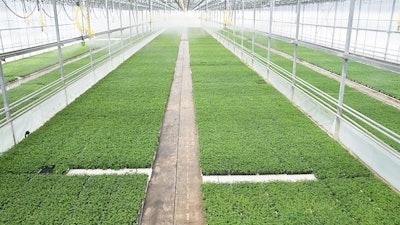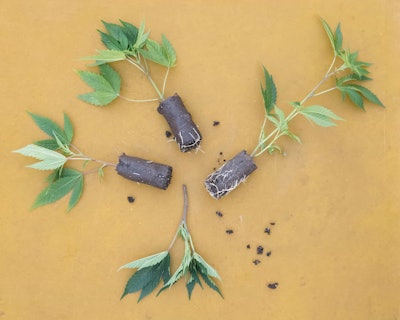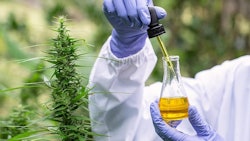
As part of a new partnership with plant breeder Dümmen Orange—which stems from a 15-year friendship with its CEO Keith Cable—grower Aaron Van Wingerden says he anticipates selling several million hemp clones in the next year to 18 months.
In late April, Dümmen Orange, through its young plant and growing media-focused Quick Plug division, announced a sales agreement with Van Wingerden’s company, Dutch Heritage Gardens, and its Royale Botanicals hemp division. Dutch Heritage Gardens also grows ornamental flowers and sources about 90% of that plant material from Dümmen Orange.
Van Wingerden, owner and president of Dutch Heritage Gardens, told Hemp Grower that his business dedicates about three acres of its 16-acre Larkspur, Colo., greenhouse facility to hemp mother stock and clone production, and also runs a one-acre hemp R&D field.
The Royale Botanicals division produces and sells a handful of cannabidiol (CBD) hemp varieties as clones; smokable flower; and tinctures, or “elixirs.” The company sells the smokable flower to dispensaries, smoke and vape shops and brokers; the tinctures via e-commerce; and the clones in bulk to other growers who grow them into mature plants. It also sells two cannabigerol (CBG) varieties in smokable flower form to extractors and retailers.

Van Wingerden, who belongs to a family with a strong presence in the ornamental horticulture industry, and now the cannabis and hemp industries, says he began growing hemp clones in 2017 and launched the breeding program soon afterward.
Since then, Royale Botanicals has increased its hemp clone output by 100-fold. “We started with 50,000 clones in 2017,” Van Wingerden says. “Last year, we grew 5 million. Our goal this year is to grow another 5 million, depending on the market, obviously.”
The Royale Botanicals and Quick Plug partnership will allow the companies to work together to improve genetics; while increasing clone distribution and, through grower customers, finished plant production, say Van Wingerden and Jamie Chittum, Quick Plug North America’s director of business development.
The partners have begun shipping clones to growers in the U.S., the Netherlands and Switzerland, Van Wingerden says.
The burgeoning hemp market can’t be ignored, Chittum says, adding: “Dümmen [Orange] has been looking at this for a while and decided that this would be a good time … [to] pilot the approach and then work with professional partners to make sure that we were part of a very sophisticated, professional supply chain.”
Working With Ornamental Horticulture Growers
Many of Dümmen Orange and Quick Plug’s ornamental grower customers have expressed interest in purchasing hemp clones, Chittum says.
“[We had] a readymade book of prospects, [so we] could go in and then say, 'Okay, you've worked with us for a number of years. We have a solution that you're looking for, and we have the technical support to make sure that you're going to be successful to do it,’” Chittum says. “That's all part of an alliance of the companies.”
Hemp presents an opportunity for ornamental growers, as Van Wingerden notes that many of their greenhouses aren’t full between June of a given year and the following January.
“[In the] spring season, we're all jammed to capacity, but during the summer and fall months, it's mums and poinsettias,” Van Wingerden says. “Most growers don't pack to the gills on those materials. So, the hemp smokable could be a great bumper crop to fill in that available space from all of these greenhouse growers that Dümmen [Orange] already sells to currently, for petunias, geraniums, marigolds, you name it.”
A Look into Royale Botanicals’ Breeding
Van Wingerden says the breeding process at Royale Botanicals takes about 18 months and involves selecting cultivars that perform well within criteria such as overall plant structure, rooting success rate, flower structure, certificate of analysis (COA) results and performance in the outdoor R&D field.
When breeding for CBD biomass, Van Wingerden says important aspects are bud structure (too large of a cola can cause bud rot and botrytis) and an ability to withstand hail and rain.
“Then, for the smokable side, we breed totally different,” he continues. “Most of the smokable material we're doing is for indoor growing or for greenhouse growing. There, it's all about the nose, the bud structure, the color and the smoke at the end of it—and terpene profile.”
Van Wingerden and his team are also looking into creating dual-purpose crops for outdoor growers that produce sizable quantities of biomass as well as some high-quality colas for the smokable hemp market.
Working to Build Trust in the Supply Chain
The companies’ teams strive to provide their customers with consistent quality and reliability, Chittum and Van Wingerden say.
Data, as well as rules and regulations on hemp-based cannabinoid end products from the U.S. Food and Drug Administration (FDA), will be required to advance the hemp industry, they add.
But, Chittum says, “If you're going to be part of the supply chain of the future, you certainly can't wait until that's all done. So, we're on the vanguard, for sure. And as it goes along, we can see it. We can certainly see the change. We can see the tide coming in, and we're getting to be the people that those folks will trust. That's what we're after.”
Echoing that thought, Van Wingerden says, “there's a lot of mistrust in the industry,” and outlines some concerns that growers have: ‘If I buy this variety, is it really going to turn out to be the right variety?’ ‘If I buy these plants that I can't tell are female, are they really going to be female?’ ‘Am I going to have hermaphroditic issues?’ ‘Am I going to have phenotypic variability?’
“I think the two of our companies aligned can put a lot of those fears to rest for anyone wanting to dip their toe into the industry but are a little bit unsure of where to get the start from.”























